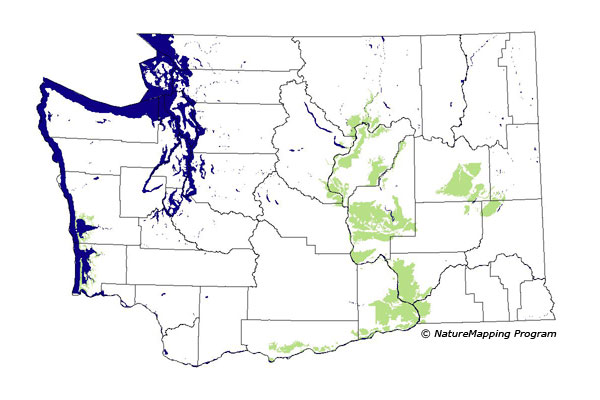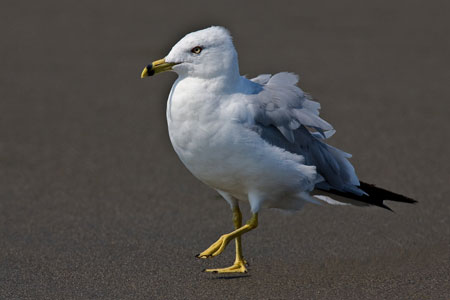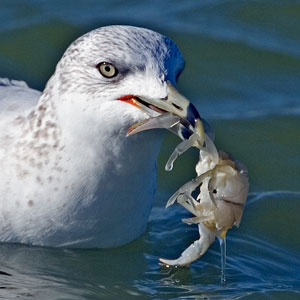

|
Ring-billed Gull (Larus delawarensis) 
Description: The Ring-billed Gull is a medium-sized, white-headed gull, that appears similar to the Herring and California Gulls, but is smaller, with a shorter bill that has a broad, black ring around it. The juvenile is mottled brown mixed with adult plumage characteristics. It has pink legs and a pink bill with a dark tip. As the bird matures, the legs turn yellow, and the bill becomes yellow with a black ring. The adult's eye is also yellow. The adult in non-breeding plumage has brown streaking on its head. 
Call: Call a shrill "oooww." Also series of short "a-a-a-a-a-a"s. Listen to calls of this species » Range / Habitat: This species is common in eastern Washington, breeding colonially on gravel islands in lakes and rivers and feeding in agricultural lands, cities, and wetlands nearby. They are locally common breeders in western Washington on dredge-spoil islands in Grays Harbor and Willapa Bay. Click the range map to learn more about the distribution of Ring-billed Gulls in Washington. 
Diet: Ring-billed Gulls eat a wide variety of things, including insects, grubs, earthworms, sewage, garbage, small rodents, fish, crabs and other aquatic organisms. Nesting: Nest a scrape in ground or vegetation, filled with twigs, sticks, grasses, leaves, lichens, and mosses. Ring-billed Gulls nests in colonies. The clutch is usually 3 eggs. Range: 1-4. Behavior: Ring-billed Gulls are gregarious, adaptable, and opportunistic birds. They spend much of their time feeding on land, but also forage while wading, swimming, or flying. These gulls spend a lot of time scavenging and often steal food from other birds.
Migration: Ring-billed Gulls migrate in flocks, following coastlines and major river valleys. In Washington, many winter residents are present along the coastline. Breeders in eastern Washington may stay in the lowlands year round, but many migrate to the coast. (BirdWeb)
Did you know?
Photos: Ring-billed Gull photo gallery Videos: Ring-billed Gull videos More Information: Ring-billed Gull - All About BirdsRing-billed Gull - BirdWeb Animal silhouettes available to purchase »
Photos: Natures Pics
|